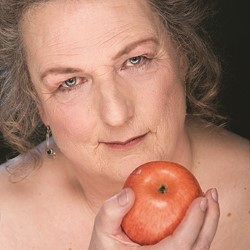Performed by acclaimed playwright and performer Jo Clifford, Eve offers audiences an authentic and intimate insight into the real life experiences of a trans person. Softly spoken, the performance is a profound reflection on one trans woman’s life, from an oppressive 1950s boyhood to the present day. Following her turbulent life journey through a time of huge personal, social and political change, Eve celebrates the victories of survival and self-actualisation.
Beautifully yet simply staged, using photographs projected onto a back screen, the piece charts Clifford’s timeline through life, from young toddler, to schoolboy, to young man, to falling in love, to the last photos taken whilst still a man, captured by one of Clifford’s two daughters.
She recalls the permitted opportunities for her to explore what it was to be like a female, and despite not being able to sing, being cast in the chorus line of a school production of H.M.S. Pinafore whilst at an all boys school and getting to wear the gingham dress; and as the pantomime dame, Madam Twanky, which only served to make herself a ridiculous version of the person she wanted to be.
Clifford’s performance is delivered not with an air of anger, but of pathos. It’s a love story of epic proportions about Clifford’s love for his mother and the feeling of being lost when she died; Clifford’s love for his partner Sue Innes, living as John whilst with her and bringing two children into the world and only being able to transition to Jo following Innes’ death from a brain tumour; Clifford’s love for his/her daughters and grandchild; and a final acceptance in the part she has to play in helping to break down society’s prejudices and barriers, through telling her personal story.
The result is an intensely personal encounter between the audience and Clifford, the protagonist and subject of this play. It’s not one that moves at any great pace, but it’s a play of our time. Eve will leave you pondering the absurdity and struggle of others who are not free to live as who they identify as (and where doing so can put them at risk of torture and death) and our need for greater acceptance and open debate in a united world, where anyone is able to live free from fear and from shame.
